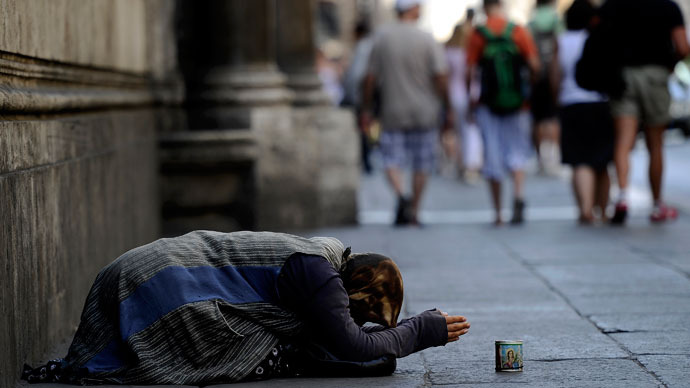As a severe recession and unprecedented unemployment sweeps Italy, millions of people are struggling to make ends meet. The number of those receiving food assistance has doubled in the past two years, according to a government report.
The data comes from national statistics institute ISTAT, which published an annual report demonstrating, among other issues, that Italy is witnessing youth unemployment of nearly 40 percent – the highest in Europe.
A reported 23.9 percent of young Italians are neither in the job market nor receiving education, the report stressed. In southern Italy, one in three young people aged 15-29 fell into this category.
Just over half (57.2 percent) of youths who graduated were currently employed, with the Europe-wide average standing at 77.2 per cent.
Fourteen percent of Italy’s population – 8.6 million people – is living on food assistance, a number that has doubled over the past two years, according to the report.
Nine poverty indicators were taken into account while carrying out the study; if a family meets more than four, it is considered to be seriously deprived. Some 15 million people – 25 percent of Italy’s population – are living in families that meet three or more of the poverty indicators, the research found.

For instance, one poverty indicator is being unable to heat one’s home, something one in five Italians cannot afford. Also, 16.6 percent of the Italians cannot afford a protein-based meal such as meat every two days, from just 6.7 percent in 2010.
Over half of the Italian population is unable to afford a one-week vacation, including a staggering 69 percent of southern Italians, according to ISTAT.
The recession, which has now lasted almost two years, has taken a heavy toll on Italians, who are increasingly digging into their savings, ISTAT stressed. The savings rate, traditionally high in Italy, is currently far below that of France and Germany, Reuters reported.
Italians' purchasing power also fell by 4.8 percent last year, an "exceptionally steep" decline caused largely by aggressive tax hikes aimed at battling the economic crisis gripping the country.
The study results come just a few days after thousands gathered in Rome to protest austerity measures and high unemployment. Demonstrators urged Prime Minister Enrico Letta to create jobs to pull the country out of recession. Protesters held banners reading, “We can’t wait anymore” and “We need money to live.”
According to a Friday poll conducted by the SWG institute, the government’s approval rating has dropped to 34 percent, down from 43 percent at the start of May.

